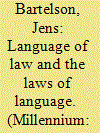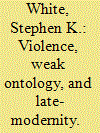| Srl | Item |
| 1 |
ID:
144068


|
|
|
|
|
| Summary/Abstract |
The Status of Law in World Society by Friedrich Kratochwil is a sophisticated attempt to reassert the importance of international law in a globalised world by grounding it in the actual practices of legal reasoning. Yet this attempt to ground normativity in practice strikes me as problematic. As I shall argue, what law is cannot be determined with reference to legal practices only, but will depend on the fulfillment of certain background requirements which themselves stand in need of further justification. Thus the recourse to linguistic practice is beset by an ambivalence that stems from the fact that language and law always already are intertwined, an ambivalence that cannot therefore be overcome with recourse to either. If it is the case that law has a language of its own, we must also be prepared to admit that language has its own laws. What then is gained by the recourse to linguistic practice is not so much a resolution but rather a temporary displacement of indeterminacy from the realm of law to that of language.
|
|
|
|
|
|
|
|
|
|
|
|
|
|
|
|
| 2 |
ID:
092142


|
|
|
|
|
| Publication |
2009.
|
| Summary/Abstract |
This essay responds to the characterization Ted Miller offers (in his December 2008 essay in Political Theory) of the kind of nonfoundationalism I have referred to as "weak ontology," and that Gianni Vattimo frequently calls "weak thought." Miller argues that such a position embodies, first, a philosophy of history in which strong ontologies (e.g., religion) are assessed categorically as passé, and, second, are associated essentially with violence. I show that while these characterizations may be appropriate for Vattimo's thought, they are not for weak ontology as I understand it. Finally, I suggest that the former might more usefully be categorized as "antifoundationalism" and the latter as "nonfoundationalism."
|
|
|
|
|
|
|
|
|
|
|
|
|
|
|
|